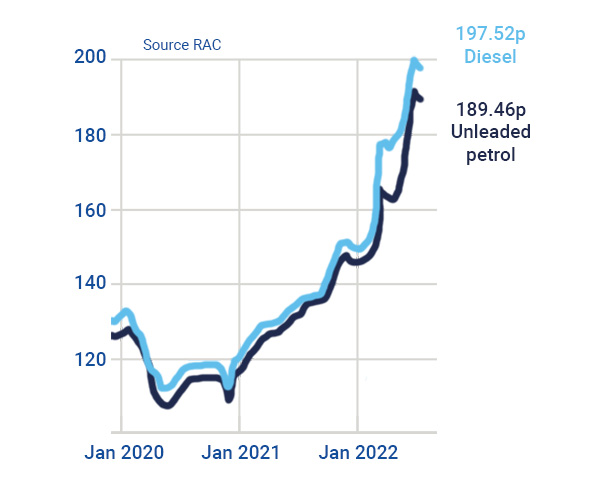Telephone 01543 270270
Has Diesel Had It's Day?
Transport is now the UK’s largest source of greenhouse gas emissions. Pressure is on the industry to transition to a much cleaner system using renewable fuels. A government scheme has been introduced to double the use of biofuels in the UK. Their target is to reach 11.4% biofuel volume by 2032:
|
4.75% 2018 |
9.75% 2020 |
11.4% 2032 |
|
Pressure is also felt thanks to the rapid increase in fuel costs that has been felt by every driver in the UK. One haulage company has estimated that last year, fuel for one of their average articulated lorries would cost about £41,000 compared to more than £61,000 this year; almost a 50% increase. In recent months the price of crude oil has jumped significantly in response to the Russian invasion of Ukraine. It had already been increasing due to the impacts of the COVID-19 pandemic. Fuel retailers also influence the price of fuel – competition can see prices cut. But some retailers are also criticised for not passing on reductions at the pump when oil prices fall. Likewise, it has been reported that not all retailers are passing on the 5p cut to fuel duty that was introduced in March by the government. |
 |
These combined pressures are resulting in more companies looking at alternative fuel sources for their fleets. What alternatives are there?
MINI has just ordered 18 new LNG lorries for transporting parts from suppliers. The new fleet has already delivered a reduction of approximately 20% in CO² and NOx emissions, compared to diesel alternatives. In the future, a total CO² reduction of up to 90% is expected by using bio-LNG.
Vauxhall are planning to release a fully hydrogen powered version of its Vivaro-e van by 2023. The electric batteries will be replaced by three 700-bar hydrogen tanks made from carbon fibre. They can be filled in just three minutes and, once brimmed, provide a range of up to 249 miles. The 45kW fuel cell is capable of generating enough power for ‘continuous motorway driving’, and an additional smaller battery can provide more power in situations such as acceleration.
An American start up, Nikola, is working with Iveco to create the first all electric trucks on the road. Its battery-electric Tre has a 750 kwh pack that will deliver 350 miles per charge and could offer up to 640hp. A fuel cell version due in another year or two will deliver at least 500 miles per tank. The company said it’s on track to start delivering the finished trucks to customers in the fourth quarter of 2021.
John Lewis and Waitrose retailers will convert its 500-strong fleet of diesel delivery trucks to be powered by bio-methane by 2028. The transition will reduce fleet emissions by more than 80% and save more than 49,000 tonnes of CO2 annually – equivalent to the carbon footprint of more than 6,000 UK households. Both John Lewis and Waitrose expect the trials to create lower running costs that will generate between £75,000 to £100,000 in lifetime savings per truck compared with a diesel equivalent.